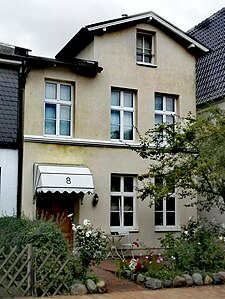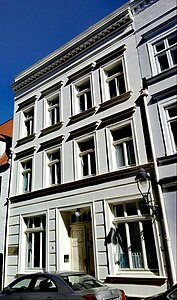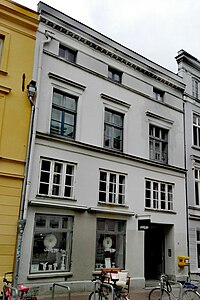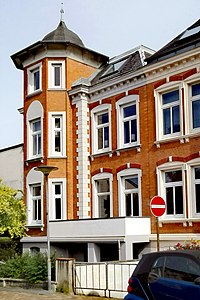Hermann Gottschalk
Heinrich Hermann Gottschalk (born January 13, 1855 in Dreylingen, written with "i" instead of "y" since 1972 a district of Eimke ; † December 25, 1930 in Lübeck ) was a German middle school director and textbook author.
Life
career
Trained at the Christian school in the Hanoverian mission town of Hermannsburg , Gottschalk moved into the renowned seminar in Osnabrück in 1872 under the direction of Johann Heinrich Schürens .
Due to Gottschalk's linguistic and musical knowledge , he was given the management of the Protestant school in the diaspora community of Iburg and the organist's office at the castle church there as early as 1875, at the age of 20 .
At the instigation of the Lübeck school council , Georg Hermann Schröder , Gottschalk was appointed to the Hanseatic city at Easter 1882 and moved into an apartment in Bismarckstrasse 8 in the suburb of St. Jürgen . Under the highly revered by him Headmaster Otto Bussenius him he called himself in his farewell speech in 1924, he collected at the grammar school experiences in the field of Volksschul- and higher education .
Michaelis In 1885 Gottschalk joined the Lübeck school service at the 1st Boys' Middle School (today: Emanuel Geibel School). The high school college elected him their first teacher there. Lange Lohberg 35 was the new apartment .
In place of the retiring JPF Burmeister, the high school authorities chose Lübeck's Gottschalk, he was appointed head of the school at Easter of that year, and from Michaelmas 1889 he was appointed main teacher at the school. In the same year he moved his residence to Fleischhauerstrasse 73 , not far from the Progymnasium and Bussenius' residence.
Gottschalk's job was to build up and expand the middle school in the Hanseatic city . Here he competed with Erhard Boedeker, principal of the 2nd boys' middle school (today: Julius-Leber-Schule), for the golden palm. A master of organization, he redesigned the establishment that had existed for over 600 years when he was taken over. He himself called a Prussian to his colleagues from Prussia schoolmen who had internalized the "General Regulations of 1872". Gottschalk became one of the protagonists in the repression of the Lübeck school system. He recognized middle school as a type of school whose aim was to train boys who would later be in trade and commerce , as well as industry and middle civil servants . Rege, he participated in the public meetings of the institutions of the Free State . As an external form of organization, he called the independent and self-contained school. The school flourished and the number of pupils rose from an initial 360 to around 1000 until the compulsory elementary school was established. Both hard work and order gave the school its character .
On April 14, 1893, the order of the electoral districts for the township elections that took place that year was determined. After that, their electoral boards were formed by elections. Gottschalk was elected as assessor in the fourth constituency ( Johannis Quartier and suburb of St. Jürgen ).
After Gottschalk moved to Wakenitzstrasse 7b in 1898 , when the opportunity arose ten years later, he moved to the house next to his school at Glockengießerstrasse 37. He stayed there until he died.
- Residential houses
During Gottschalk's last years in office after the First World War , the pre-school was dismantled on the basis of the imperial constitution . In Lübeck, the preschool was abolished as an independent school type and transformed into a combined middle and elementary school . As a result of the “Teacher Reduction Act”, he was forced to retire at Easter 1924 .
Gottschalk was involved in the church in various ways. Since 1898 he was a member of the church council of St. Marien and was there until 1924 as a poor carer . He was a board member of the main association of the German Luther Foundation in Lübeck and a delegate at the 10th Evangelical Social Congress , which took place in Kiel in 1899 .
He also belonged to the group of teachers involved in the processing of school books in the field of religion and singing in favor of the teachers widow's fund. He trained teachers in their seminars and was temporarily a trainer at the preparation institute . From 1890 to 1903 he was a member of the board of directors of the Lübeck Teachers' Seminar . For 20 years he was the examiner of the examination committee for the second teacher examination .
In conjunction with the Marburg seminar director Johannes Meyer , Gottschalk wrote a number of widely distributed religious books for elementary and middle schools based on the then new principles, as well as elementary exercises for singing lessons. His articles in specialist journals and daily newspapers in favor of the middle school helped to pave the way for the recognition of this new type of school.
Gottschalk supported several youth clubs with his musical performances. Over time, he was made an honorary member of all of them. Music was not only practiced by him, but also created. Thus, the unknown at the time of each Lübeck came home fashion "intoxicated, wave" and the widespread contemporary song "Rheintreue" from his pen. His composed tunes were reprinted in the Vaterstadtischen Blätter or appeared in offprints . In 1913, for the 100th anniversary of the end of the Lübeck French era, the “Lübecker Lied”, which he composed, was published. During the war, too, like the imperial hymn “Zieh 'go, mein Kaiser!” ( Op. 12 ), there were some “moving patriotic tunes”, characterized by religiously inflated nationalism.
family
Gottschalk had married Marie Sophie Charlotte, née Grote. The marriage resulted in two daughters. His wife died almost six months before him on June 27, 1930.
When Gottschalk died after a long period of suffering, he already had three grandchildren.
Awards
What the order was in a monarchical state has been a simple commemorative coin in a state like that of Lübeck, which was based on self-administration. Three such medals are awarded in Lübeck. The first was awarded by the Senate, the second by the Chamber of Commerce and the third by the Society for the Promotion of Charitable Activities.
When Gottschalk left school, his services to the secondary school system in Lübeck were recognized accordingly. The Senate awarded him the honorary commemorative Bene Merenti in silver.
The high school authorities and the middle school association expressed their gratitude and appreciation in a letter of thanks on that occasion.
Works
- Evangelical religion book: contains biblical history, introduction to Bible reading, biblical studies and church history plus appendix. Hanover List: C. Meyer
- The work was available in different editions and formats: Edition F: In a simplified version or later For elementary schools had 14 editions up to 1929; the main edition for middle schools and related institutions appeared in 1928 in the 7th edition
literature
- Middle school principal Hermann Gottschalk †. by Karl Möller, Rector of the St. Lorenz-Knaben-Mittelschule in: Lübeckische Blätter , 73rd year, No. 2, edition of January 11, 1931, pp. 19-20.
- Middle School Rector i. R. Hermann Gottschalk †. In: Vaterstädtische Blätter , year 1930/31, No. 7, edition of January 3, 1931, p. 25.
- Middle school principal Hermann Gottschalk. In: Vaterstädtische Blätter , year 1924/25, No. 9, edition of January 25, 1925, p. 33.
- Rector Hermann Gottschalk. In: Von Lübeck's Towers , Volume 37, No. 13, Edition of May 10, 1924, p. 52.
Web links
Individual evidence
- ↑ former Christian school
- ↑ Otto Bussenius died on April 6, 1924 at the age of 76 in Lübeck.
- ↑ Local and mixed notes. In: Lübeckische Blätter , Volume 27, No. 34, Edition of April 29, 1885, p. 200.
- ↑ Local and mixed notes. In: Lübeckische Blätter , Volume 31, No. 72, Edition of September 8, 1889, p. 404.
- ↑ Citizens' Committee. In: Lübeckische Blätter , 35th year, no. 32, edition of April 14, 1893, pp. 186–187.
- ↑ In 1913 the numbering of the houses on Wakenitzstrasse changed . The former points behind the numbers disappeared and the "15", the "7b" changed .
- ↑ Local Notes. In: Lübeckische Blätter , Volume 40, No. 4, edition of January 23, 1898, p. 31.
- ^ The negotiations of the Tenth Evangelical Social Congress. Göttingen: Vandenhoeck & Ruprecht 1899, p. 134
- ↑ A song about the Hanseatic city
- ^ High school principal Hermann Gottschalk. In: Lübeckische Blätter , 66th Volume, No. 28, edition of April 30, 1924, p. 357.
| personal data | |
|---|---|
| SURNAME | Gottschalk, Hermann |
| ALTERNATIVE NAMES | Gottschalk, Heinrich Hermann (full name) |
| BRIEF DESCRIPTION | German pedagogue, Lübeck school reformer |
| DATE OF BIRTH | January 13, 1855 |
| PLACE OF BIRTH | Dreylingen |
| DATE OF DEATH | December 25, 1930 |
| Place of death | Lübeck |






